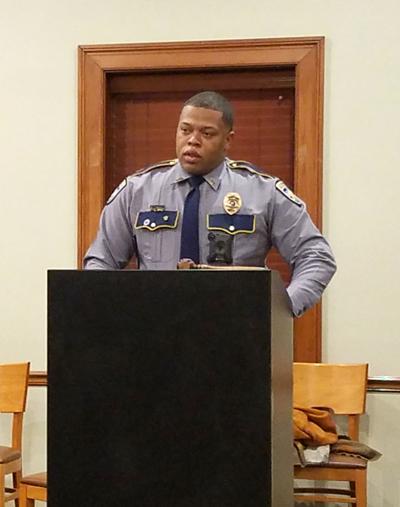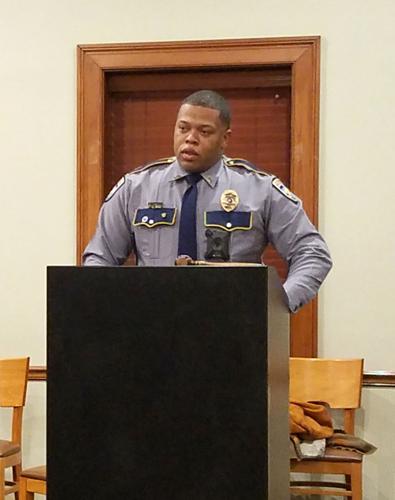Twenty-three days after she found former Baton Rouge police Officer Donald Steele Jr. guilty of a "misdemeanor grade" of malfeasance in office, District Judge Eboni Johnson Rose admitted Thursday that she made a mistake in her original ruling and rendered a new verdict: not guilty.
Steele had no comment as he walked out of the courthouse afterward as a free man.
Prosecutors said they plan to file a writ to the First Circuit Court of Appeal by June 10, challenging the judge's new ruling.
Assistant District Attorney Dana Cummings, who led the state's prosecution during Steele's trial last month, appeared stunned by the change in outcome.
"I am shocked. She changed a verdict that she legally rendered and filed into the court record," Cummings said just outside the courtroom. "There is a record of the verdict that she filed in this case."
Authorities alleged Steele, 37, solicited sex from a 19-year-old Southern University college student during a traffic stop early the morning of June 23, 2021. He was tried for second-degree kidnapping and felony malfeasance in office.
Johnson Rose presided over a two-day bench trial and acquitted the former officer of second-degree kidnapping. She declared him guilty of a lesser misdemeanor malfeasance charge in her March 26 verdict.
But state law does not include a misdemeanor variant of malfeasance in office, and attorneys from both sides met with the judge in her chambers the day after the trial ended to review her mixed verdict. Johnson Rose ordered prosecutors and Steele's legal team to file motions making their respective arguments to sort out the confusion. The state asked the judge to convict Steele of the felony, and defense lawyers petitioned for a full acquittal in the case.
During Thursday's hearing, Johnson Rose acknowledged that the "court was in error" in her original verdict.
"I can admit when I've actually misread something," she said moments before finding Steele not guilty.
"The judge’s decision confirms what we always knew and fought for. Donald Steele is innocent," his lawyers said in a statement Thursday morning. "Reports to the contrary were premature and did not take into account the court’s determination that no sexual battery occurred. The state does not have the right to appeal an acquittal. In the event they attempt to, we look forward to maintaining the court’s declaration of Mr. Steele’s innocence in any and all forums."
During the trial, Cummings said Steele was “hunting for coeds” during the predawn stop when he pulled over a Southern University student as she left her apartment complex near Burbank Drive. The student, Trimiria Pitcher, testified that he accused her of being intoxicated, but told her she was “too pretty” for a ticket.
Pitcher said that, after 30 minutes, Steele threatened to arrest Pitcher for DWI if she didn’t follow him to a warehouse in the 600 block of Chippewa Street. At that location, she said, the officer groped her and kissed her without consent, told her he could give her the “best sex she’s ever had,” showed her videos of him having sex with other women and insisted on coming to her apartment later that morning to have sex.
Prosecutors amended Steele’s malfeasance indictment on the trial’s opening day to specify the charge was tied to acts of sexual misconduct. The state has indicated Johnson Rose was “operating under the mistaken belief” that when prosecutors made that change, they were trying Steele for a more severe charge of malfeasance in office that prohibits law enforcement officers from engaging in sexual behavior with people detained in their custody. Offenders convicted of that enhanced malfeasance charge could face up to a 10-year max in prison, under state law.
Johnson Rose, according to attorneys, didn’t find Pitcher’s trial testimony credible and wasn't convinced by the state that a sexual battery actually occurred. That is why she initially found him guilty of a lesser malfeasance charge, which she deemed to be of a misdemeanor level.
Prosecutors objected to the revised verdict at Thursday’s hearing. When they asked for a deadline to file a petition in appeals court, Steele’s lawyers wondered if the state has the right to appeal an acquittal.
“They do not. But guess what, people file lawsuits all the time,” Johnson Rose said.
The judge said she saw “no statutory basis” for prosecutors to appeal the decision, but “out of an abundance of caution” gave them until June 10 to take the issue up at the First Circuit Court of Appeal.
Double jeopardy laws prevent prosecutors from relitigating cases following an acquittal. But Cummings explained that the legal writ she plans to file is not technically an appeal.
“What you can take a writ on is the judge, without authority to do so, changing a verdict,” the prosecutor said. “She’s gone back and changed her legally — LEGALLY — filed verdict into the record.”


